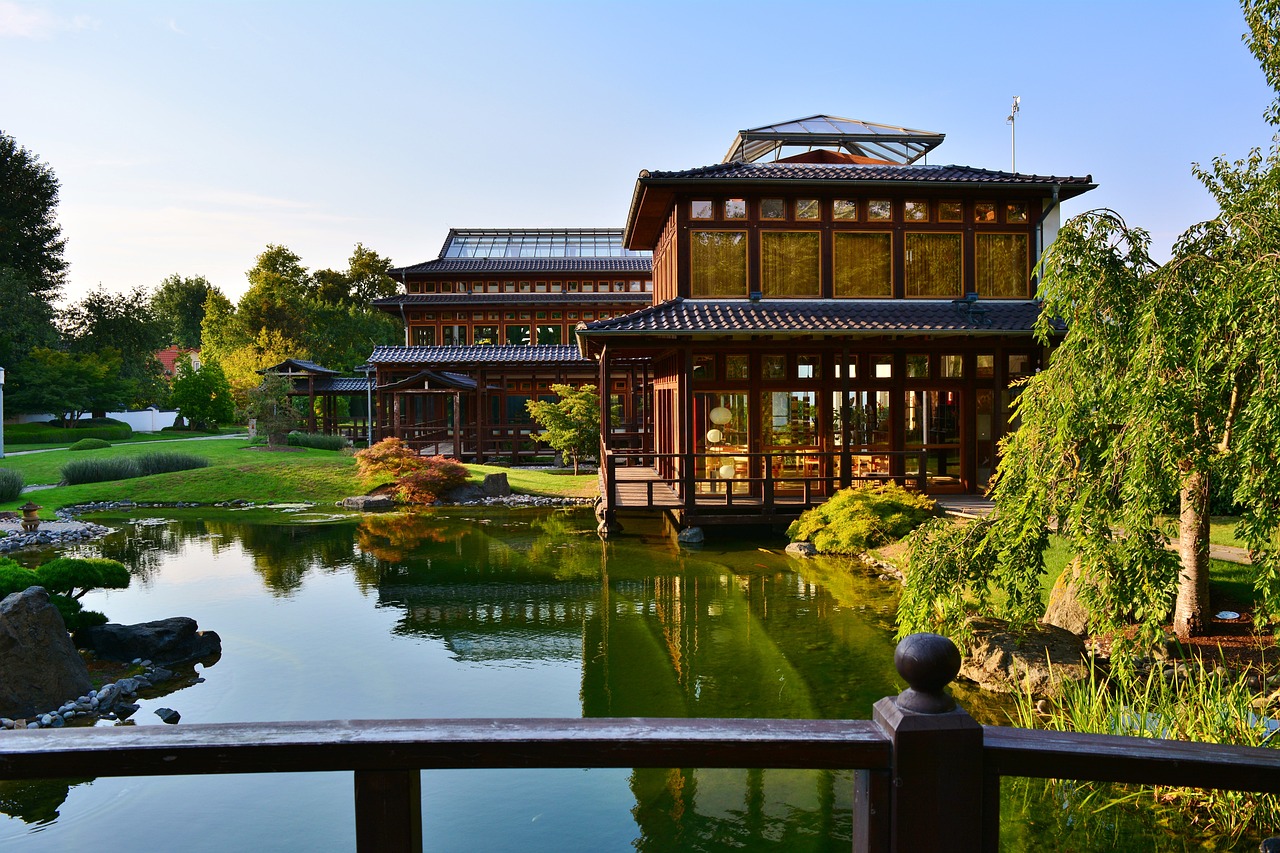Sustainable Tourism in Japan’s Nara
When it comes to sustainable tourism in Japan's Nara, the region stands out for its remarkable efforts in preserving both its cultural heritage and natural environment. Nara has taken significant steps to promote practices that not only benefit the local community and economy but also ensure the long-term sustainability of its tourism industry.

Historical Preservation
Exploring the efforts and initiatives in Nara, Japan, to promote sustainable tourism practices that preserve the region's cultural heritage and natural environment while benefiting the local community and economy.
Historical preservation in Nara is a cornerstone of sustainable tourism efforts. The city's ancient temples, shrines, and traditional neighborhoods hold invaluable historical significance that must be protected for future generations. By implementing sustainable tourism practices, Nara aims to minimize environmental impact and visitor disturbance at these historical sites. Through careful planning and conservation strategies, the city ensures that tourists can experience the rich history of Nara without compromising its integrity.
Efforts in historical preservation go beyond mere maintenance; they involve a deep commitment to safeguarding the cultural heritage that defines Nara. By striking a balance between conservation and tourism, the city ensures that its historical sites remain authentic and accessible to visitors while preserving their original charm. This approach not only benefits tourism but also fosters a sense of pride and stewardship among locals, who play a crucial role in protecting Nara's historical treasures.
Collaboration between government agencies, heritage organizations, and local communities is vital in ensuring the success of historical preservation initiatives. By working together, stakeholders can develop innovative solutions to challenges such as overcrowding, wear and tear, and the impact of tourism on historical structures. Through these partnerships, Nara can create a sustainable model for preserving its historical sites that serves as a beacon of inspiration for other destinations facing similar challenges.
In essence, historical preservation in Nara is not just about maintaining old buildings; it is about safeguarding the soul of the city. By embracing sustainable tourism practices that respect and protect its cultural heritage, Nara ensures that its history continues to captivate and inspire visitors from around the world for generations to come.

Community Engagement
Community engagement plays a vital role in the sustainable tourism initiatives in Nara, Japan. Local residents are actively involved in tourism development, offering unique cultural experiences to visitors. Through homestays, residents open their homes to tourists, providing a glimpse into traditional Japanese lifestyle and fostering cross-cultural interactions. This engagement not only benefits the local economy but also promotes mutual respect and understanding between visitors and residents.
Furthermore, community members have the opportunity to share their traditions and heritage with tourists, showcasing the rich cultural tapestry of Nara. By participating in cultural workshops, visitors can learn traditional arts and crafts directly from local artisans, gaining a deeper appreciation for the region's heritage. These interactions create a sense of connection and authenticity, enhancing the overall tourism experience.
Collaborative efforts between local communities and tourism authorities have led to the development of immersive cultural programs that highlight Nara's unique identity. From tea ceremonies to traditional performances, visitors can engage with the local community in meaningful ways, contributing to the preservation and promotion of Nara's cultural heritage.

Ecotourism Initiatives
When it comes to ecotourism initiatives in Nara, Japan, the focus is on promoting activities that not only allow visitors to immerse themselves in the region's natural beauty but also contribute to the conservation of the environment. One of the key aspects of ecotourism in Nara is the emphasis on responsible travel behaviors that minimize the carbon footprint and support local conservation efforts. Visitors are encouraged to engage in eco-friendly activities such as hiking, cycling, and wildlife watching, which not only offer a unique experience but also help in preserving Nara's natural landscapes.
Moreover, ecotourism initiatives in Nara aim to raise awareness about the importance of environmental sustainability among tourists. By participating in these activities, visitors can gain a deeper appreciation for the region's biodiversity and the need to protect it for future generations. From guided nature walks to bird-watching tours, ecotourism in Nara offers a range of experiences that showcase the harmony between nature and culture in this historic city.
Additionally, local tour operators and guides play a crucial role in promoting ecotourism in Nara by educating visitors about the significance of conservation efforts and the impact of their actions on the environment. By fostering a sense of stewardship among tourists, these initiatives aim to create a sustainable model of tourism that benefits both the local community and the natural surroundings.

Cultural Experiences
When visiting Nara, Japan, travelers are immersed in a world where tradition meets modernity, offering a unique blend of cultural experiences that leave a lasting impact. From the mesmerizing beauty of ancient temples to the intricate craftsmanship of traditional arts, Nara showcases a rich tapestry of heritage that captivates visitors.
One of the highlights of cultural experiences in Nara is the opportunity to witness traditional performances such as Noh and Kabuki, where skilled artists bring centuries-old stories to life through dance and music. These performances not only entertain but also educate visitors about the deep-rooted cultural significance behind each movement and gesture.
For those seeking a hands-on experience, workshops led by local artisans offer a glimpse into the meticulous process of creating Washi paper, pottery, or silk textiles. Visitors can try their hand at these age-old crafts under the guidance of master craftsmen, gaining a newfound appreciation for the precision and skill required to produce such exquisite pieces.
Exploring Nara's traditional neighborhoods like Naramachi provides a window into the daily lives of residents, with preserved machiya townhouses and quaint shops selling local delicacies and handicrafts. Strolling through these historic streets feels like stepping back in time, offering a glimpse of Japan's bygone eras.
Moreover, cultural experiences in Nara extend beyond tangible artifacts to intangible treasures like tea ceremonies, calligraphy lessons, and kimono dressing. These immersive activities allow visitors to engage with Japanese customs firsthand, gaining insight into the etiquette, symbolism, and grace embedded in everyday rituals.
By participating in these cultural experiences, travelers not only support local artisans and performers but also contribute to the preservation of Nara's cultural heritage for future generations. Each interaction becomes a thread in the intricate tapestry of Nara's identity, weaving together past and present in a harmonious blend of tradition and innovation.

Sustainable Accommodation
In Nara, sustainable accommodation options play a vital role in promoting eco-friendly tourism practices that align with the region's commitment to environmental conservation and community well-being. These accommodations go beyond just providing a place to stay; they embody the principles of sustainability in every aspect of their operations.
One of the key features of sustainable accommodation in Nara is their focus on energy efficiency. From utilizing renewable energy sources like solar power to implementing energy-saving technologies such as LED lighting and efficient heating and cooling systems, these establishments minimize their carbon footprint while providing a comfortable stay for guests.
Moreover, sustainable accommodations in Nara prioritize waste reduction and responsible waste management. By implementing recycling programs, composting organic waste, and reducing single-use plastics, these establishments contribute to the city's cleanliness and environmental health.
Local sourcing is another important aspect of sustainable accommodation in Nara. Many eco-friendly hotels, guesthouses, and ryokans collaborate with local producers and artisans to offer guests authentic experiences and support the local economy. From locally sourced organic food served in restaurants to handmade crafts and amenities, these accommodations showcase the rich cultural heritage of Nara.
Furthermore, sustainable accommodations in Nara often incorporate traditional Japanese design elements and practices that enhance the overall guest experience. From tatami mat flooring to natural materials like wood and paper, these establishments provide a unique blend of modern comfort and traditional charm.
By choosing to stay in sustainable accommodation in Nara, travelers not only contribute to the preservation of the environment and support the local community but also have the opportunity to immerse themselves in the authentic beauty and culture of the region.

Transportation Strategies
When it comes to exploring the ancient wonders of Nara while minimizing your carbon footprint, transportation plays a crucial role. The city has embraced sustainable transportation options to enhance the overall visitor experience and reduce environmental impact. Electric buses have become a popular choice for tourists, offering a convenient and eco-friendly way to navigate the city's historic streets. Additionally, bicycle rentals are widely available, allowing travelers to immerse themselves in the local culture while pedaling through picturesque landscapes.
Walking tours are another fantastic way to discover Nara's hidden gems while promoting a healthy and sustainable lifestyle. These guided tours not only provide insight into the city's history and traditions but also encourage visitors to appreciate the beauty of Nara at a leisurely pace. By opting for walking tours, tourists can reduce traffic congestion and noise pollution, contributing to a more peaceful and harmonious urban environment.
Moreover, the integration of sustainable transportation strategies aligns with Nara's commitment to preserving its cultural heritage and natural beauty for future generations. By encouraging visitors to choose eco-friendly transportation options, the city aims to protect its historical sites and minimize the negative impact of tourism on the environment. Through these initiatives, Nara sets an example for other destinations seeking to balance tourism growth with environmental conservation.

Waste Management
Exploring the efforts and initiatives in Nara, Japan, to promote sustainable tourism practices that preserve the region's cultural heritage and natural environment while benefiting the local community and economy.
Efforts to maintain and protect Nara's historical sites, including ancient temples, shrines, and traditional neighborhoods, through sustainable tourism practices that minimize environmental impact and visitor disturbance.
Involving local residents in tourism development, offering cultural experiences, homestays, and opportunities for community members to share their traditions and heritage with visitors, fostering mutual respect and understanding.
Promoting eco-friendly activities such as hiking, cycling, and wildlife watching in Nara's natural landscapes, encouraging responsible travel behaviors that support conservation efforts and minimize carbon footprint.
Showcasing traditional arts, crafts, and performances to tourists, providing authentic cultural experiences that educate visitors about Nara's rich heritage and traditions while supporting local artisans and cultural preservation.
Highlighting eco-friendly hotels, guesthouses, and ryokans in Nara that prioritize energy efficiency, waste reduction, and local sourcing, offering travelers sustainable lodging options that respect the environment and community.
Introducing sustainable transportation options in Nara, such as electric buses, bicycle rentals, and walking tours, to reduce traffic congestion, air pollution, and carbon emissions associated with tourism activities.
Addressing waste management challenges in Nara by implementing recycling programs, reducing single-use plastics, and promoting responsible waste disposal practices among tourists and local businesses to maintain the city's cleanliness and beauty.
Exploring the role of partnerships between government agencies, businesses, NGOs, and local communities in advancing sustainable tourism goals in Nara, fostering cooperation and innovation for long-term environmental and socio-economic benefits.

Partnerships and Collaborations
Partnerships and collaborations play a crucial role in advancing sustainable tourism goals in Nara, Japan. By bringing together government agencies, businesses, NGOs, and local communities, these partnerships foster cooperation and innovation for long-term environmental and socio-economic benefits.
Government agencies in Nara work hand in hand with local businesses to implement sustainable tourism practices. By setting regulations and guidelines, they ensure that businesses operate in an environmentally friendly manner, promoting responsible tourism that respects the region's cultural heritage and natural resources.
Non-governmental organizations (NGOs) play a vital role in Nara's sustainable tourism efforts. These organizations often spearhead conservation projects, community engagement initiatives, and educational programs that raise awareness about the importance of preserving Nara's unique heritage and environment.
Collaborations between businesses and local communities are essential for creating authentic and meaningful experiences for tourists. By involving community members in tourism activities, such as guided tours, traditional craft workshops, and cultural performances, visitors can gain a deeper appreciation for Nara's rich cultural tapestry.
Partnerships between different stakeholders also enable the sharing of best practices and innovative ideas. By exchanging knowledge and expertise, organizations can continuously improve their sustainability efforts, leading to a more resilient and vibrant tourism industry in Nara.
Overall, partnerships and collaborations are the cornerstone of sustainable tourism in Nara, driving positive change and ensuring that the region's cultural heritage and natural beauty are preserved for future generations to enjoy.
Frequently Asked Questions
- What is sustainable tourism?
Sustainable tourism refers to practices that aim to minimize the negative impacts of tourism on the environment, culture, and economy of a destination. It involves responsible travel behaviors that support conservation efforts, preserve cultural heritage, and benefit local communities.
- How does Nara promote historical preservation through sustainable tourism?
Nara promotes historical preservation through sustainable tourism by implementing measures to protect ancient temples, shrines, and traditional neighborhoods. This includes limiting visitor numbers, encouraging respectful behavior, and supporting conservation projects to maintain the historical sites for future generations.
- What are some examples of ecotourism initiatives in Nara?
Ecotourism initiatives in Nara include promoting eco-friendly activities such as hiking, cycling, and wildlife watching in the region's natural landscapes. These activities not only allow visitors to appreciate the natural beauty of Nara but also support conservation efforts and reduce the carbon footprint associated with tourism.
- How does sustainable accommodation contribute to responsible tourism in Nara?
Sustainable accommodation options in Nara, such as eco-friendly hotels, guesthouses, and ryokans, play a crucial role in responsible tourism. These establishments prioritize energy efficiency, waste reduction, and local sourcing, offering travelers environmentally friendly lodging choices that support the local community and environment.
- What transportation strategies are available for sustainable travel in Nara?
Nara offers sustainable transportation options such as electric buses, bicycle rentals, and walking tours to reduce traffic congestion, air pollution, and carbon emissions associated with tourism activities. These strategies help minimize the environmental impact of travel while providing convenient and eco-friendly ways to explore the city.
- How can tourists contribute to waste management efforts in Nara?
Tourists can contribute to waste management efforts in Nara by participating in recycling programs, avoiding single-use plastics, and practicing responsible waste disposal. By following sustainable waste management practices, visitors can help maintain the cleanliness and beauty of Nara for future generations to enjoy.
- What role do partnerships and collaborations play in sustainable tourism development in Nara?
Partnerships and collaborations between government agencies, businesses, NGOs, and local communities are essential for advancing sustainable tourism goals in Nara. By working together, these stakeholders can innovate, share resources, and implement initiatives that benefit the environment, society, and economy of the region in the long term.



















